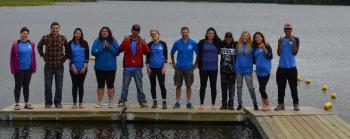Image Caption
By Sam Laskaris
Windspeaker Contributor
EDMONTON
Following another successful run of Alberta’s Future Leaders (AFL), program officials are now preparing for their 2018 ventures.
The AFL, which has been around for the past 21 years, provides Indigenous youth (ages nine to 25 years) in Alberta with the chance to have positive new experiences through sports, arts and leadership activities.
The programs are provided through mentors that have been trained about the histories and cultures of the communities they will be working in. Each participating community in the AFL program is assigned two mentors.
In 2017, the AFL was offered in six First Nation communities, as well as three Métis settlements. Participating First Nations were Tallcree, Dene Tha’, Heart Lake, Sucker Creek, Whitefish Lake #128 (which is also known as Goodfish Lake) and Whitefish Lake #459 (Atikameg).
And the three Métis settlements that took part were Buffalo Lake, Gift Lake and Kikino.
“We seem to be fairly unique in our programming and I think we’ve made a significant contribution in the communities we’ve been in,” said Scott Grevlund, the AFL’s program co-ordinator.
Since its inception, more than 40 First Nations or Métis settlements from across Alberta have benefitted from the program.
“We listen to what the community wants,” Grevlund said. “And we listen to what the parents want and what the kids want. Then we build up a program that is suited for the community.”
For those that are involved with the venture, the AFL agrees to provide three years of programming.
Program officials stagger the years that they will begin programming in various communities. And AFL officials don’t always stick to providing just three consecutive years of programming.
“We’ve been in some communities for five years,” Grevlund said. “But those were special cases.”
Communities that have their AFL programming expire can apply in future years to have it reinstated again.
AFL representatives are currently accepting applications from those communities that would like to be involved in 2018. A few have already expressed a desire to take part.
“We’re in discussions with them now,” Grevlund said. “We’re telling them what is expected of them and what we provide. And we tell them what they need to provide and contribute.”
For example, each participating community is responsible to provide housing for the two mentors assigned to them.
The AFL program traditionally runs from late April until August. Mentors teach life skills through activities, special events and trips outside the community.
Some individuals from each participating community are also selected to attend an AFL-run leadership camp. Events such as rock climbing, canoeing and hiking help to enhance their leadership potential.
AFL officials will also start recruiting for 2018 mentors in January.
“The mentors grow just as much as the kids do as well,” Grevlund said. “It’s not an easy job for the summer. Mentors also get experience and grow a lot during the summer. It’s very challenging for them, but also very rewarding.”
Those thinking of applying to be a mentor do not have to necessarily be Indigenous. And they don’t have to live in Alberta.
“Half our mentors are Indigenous,” Grevlund said. “And we hire across the country.”
Kody Taylor, an Ojibwe who lives in Edmonton, was chosen to serve on the Alberta Sports Connection board earlier this year. As part of her responsibilities with that agency, which promotes and develops sports in the province, Taylor also serves as the chair for the provincial support committee for the AFL.
Taylor attended training and orientation sessions for AFL mentors this year. She also read wrap-up reports from each participating community this year. And she also attended an AFL community and sponsorship recognition day held in Edmonton in August.
One of the programs Taylor was most impressed with this year was having Indigenous hip hop artist Drezus visit the Tallcree First Nation.
“It was incredibly impactful,” she said. “He helped them create this song and then he brought them into his studio in Edmonton to record it.”
Taylor was also impressed with another program that took place at the Tallcree First Nation in June. AFL officials developed a relationship with a local trapper, Mike Hamelin, who owns a local camp. Youth from the community went to Hamelin’s camp to learn traditional ways.
“I thought that was powerful because a lot of traditional knowledge has been lost and being able to learn directly from our Elders on traditional ways of life and connecting with the land will help bring us back to our roots,” Taylor said.
Taylor was also pleased to see that a number of mentors brought youth to watch some of the sports contested at this summer’s World Indigenous Games held in Edmonton.

